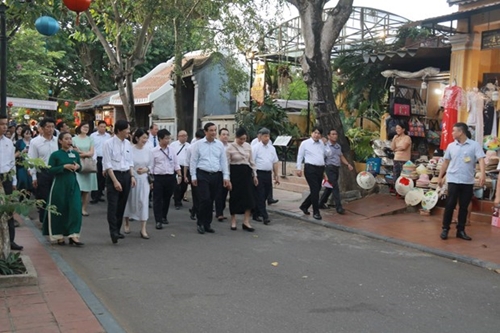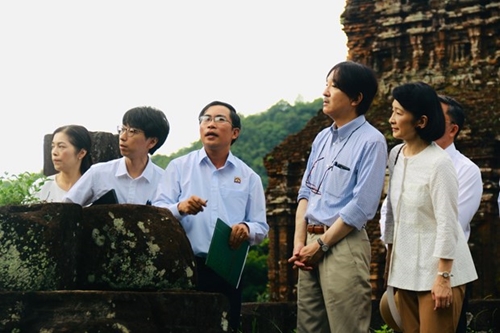In Hoi An city, home to Hoi An Ancient Town, the couple paid a courtesy call on leaders of Quang Nam province on September 23.
    |
 |
|
Japanese Crown Prince Fumihito Akishino and Crown Princess Kiko visit Hoi An Ancient Town on September 23. |
Phan Viet Cuong, Secretary of the provincial Party Committee, informed them about the recent cooperation results between Quang Nam and Japanese localities, expressing his hope that the Crown Prince and Crown Princess will continue helping promote the Vietnam - Japan friendship and cooperation as well as Quang Nam’s ties with Japanese partners and localities,
Crown Prince Akishino highlighted the special significance of his visit to Vietnam, which is his first overseas trip after the COVID-19 pandemic and also the first to the Southeast Asian nation by the Japanese Royal Family since the visit by the Japanese Emperor and Empress in 2017.
In Hoi An, the couple visited the ancient town, the Chua Cau (Bridge Pagoda) relic site, and an exhibition hall of the Japanese culture. They also watched a tea ceremony and took photos of Japanese costumes at the relic sites typical for the over-400-year relations between the two countries.
On September 24, they set foot at My Son Sanctuary in Duy Phu commune of Duy Xuyen district.
    |
 |
|
Japanese Crown Prince Fumihito Akishino (second from right) and Crown Princess Kiko (first from right) visit My Son Sanctuary on September 24. |
Accompanying them during the tour, Chairman of the provincial People’s Committee Le Tri Thanh gave a brief introduction of the heritage site and its restoration process. He expressed his hope that the Japanese Government will provide financial and technical assistance and share experience to help Quang Nam restore, preserve, and sustainably bring into play the values of My Son Sanctuary.
My Son Sanctuary, built between the late 4th century and the 13th century, features a number of unique cultural, artistic, and architectural values. As the most famous architectural complex of the Cham ethnic people in Vietnam, it was recognized as a World Heritage Site by UNESCO in December 1999.
Source: VNA